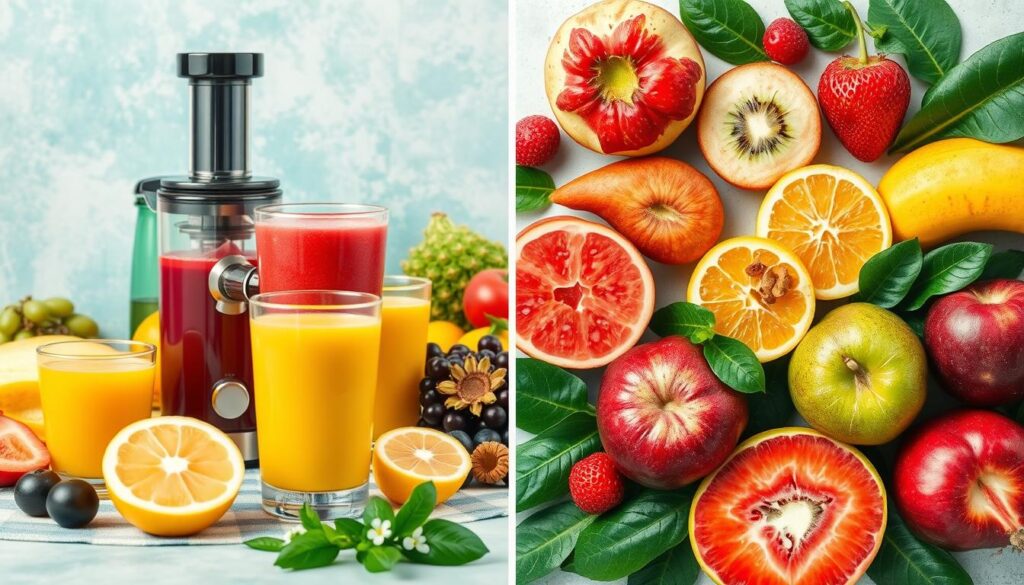Fruit consumption can be puzzling. Should you juice or eat whole fruits? This question sparks debate in nutrition circles.
Juicing promises quick nutrition and health benefits. However, research favors whole fruits. Juicing removes most of the healthy fiber that makes fruits nutritious1.
Your body processes whole fruits and juice differently. Blending fruits and veggies provides more nutrients, plant chemicals, and fiber1. If eating whole fruits is tough, juicing might help1.
Be careful with homemade juices. Harmful bacteria grow fast in fresh juice. Drink it immediately or choose pasteurized options1.
Key Takeaways
- Whole fruits provide more nutritional benefits than juices
- Fiber is significantly reduced during juicing process
- Juice cleanses lack strong scientific evidence for health claims
- Blending preserves more nutrients compared to traditional juicing
- Fresh juices should be consumed quickly to prevent bacterial growth
Understanding the Nutritional Battle: Juicing vs. Whole Fruits
Fruit lovers often debate the best way to enjoy their favorite treats. The Juice vs. Smoothie discussion is crucial for those seeking optimal nutrition. Let’s explore why whole fruits trump juice for your health.
Whole fruits offer a more balanced option for maintaining health. They contain less sugar and more fiber than fruit juice. This makes them a superior choice for your diet.
The Sugar Content Comparison
Orange juice packs more sugar than a whole orange. A cup of orange juice has 21 grams of sugar. In contrast, a medium orange contains only 12 grams2.
This concentrated sugar can cause rapid blood sugar spikes. It may also lead to weight gain2. A cup of grape juice equals the sugar of 50 grapes2.
- A cup of grape juice equals the sugar content of 50 grapes2
- Nutrition experts caution against added sugars in juices and smoothies2
Fiber Factor: Why It Matters
Fiber in whole fruits is crucial for your health. It supports multiple bodily functions. Increasing fiber intake by 10g daily can reduce coronary event risks by 14%3.
Whole fruits are not just food, they’re nature’s health packages.
Vitamin and Mineral Absorption
Whole fruits offer more than just nutrients. They contain polyphenols bound to dietary fiber. These compounds may prevent cardiovascular diseases and cancers3.
An auger-style juicer retains more fiber-rich pulp than other methods2. Eating whole blueberries can lower type 2 diabetes risk by 33%3.
- Consuming whole blueberries can decrease type 2 diabetes risk by 33%3
- Whole fruits support gut health by feeding beneficial bacteria3
The Health Impact of Fruit Consumption Methods
Juicing for Weight Loss requires understanding how whole fruits differ from fruit juice. Your body processes these differently. Whole fruits contribute less to obesity than fruit juices due to their unique nutritional makeup4.
Your diet choices greatly affect weight management. Whole fruits increase fullness and slow sugar release into your blood4. Fruit fiber reduces overall energy intake by making you feel full and curbing cravings4.
- Whole fruits help regulate blood sugar levels
- Fruit fiber promotes gut health
- Juicing can lead to faster sugar absorption
Surprisingly, less than 10% of Westerners eat enough whole fruits and fiber5. This gap shows why understanding Whole Fruit Calories matters. For adults, juice often replaces whole fruits, making up one-third of daily fruit intake5.
“Nutrition is not about perfection, but making informed choices”
During a Juicing Cleanse, remember that fruit juice spikes blood glucose and insulin faster than whole fruits4. This quick absorption raises risks of type 2 diabetes and potential weight gain4.
Scientific research shows whole fruits offer greater health benefits than fruit juices. They provide more nutrients and help maintain a healthy weight.
Conclusion
Your choice between whole fruits and juicing can greatly affect your health. Doctors consistently recommend whole fruits for optimal wellness6. Whole fruits offer fiber, vitamins, minerals, and beneficial compounds that support your body’s needs6.
Research shows interesting effects of fruit consumption on genetic expression. Whole fruit eaters showed better DNA signatures linked to improved immune function7. This highlights the importance of choosing whole fruits over juice7.
Juicing offers quick nutrient intake but may lack the full benefits of whole fruits6. Fiber in whole fruits helps moderate sugar absorption and lowers type 2 diabetes risk6.
A balanced diet with both whole fruits and occasional juicing ensures diverse nutrient intake6. Prioritizing whole fruits can lead to better long-term health outcomes. Understanding these differences helps you make informed dietary choices for your wellness journey.
FAQ
Is juicing healthier than eating whole fruits?
How much sugar is in fruit juice?
What’s the difference between juicing and blending?
Can fruit juice help with weight loss?
Are juice cleanses or fasts effective?
How do whole fruits impact blood sugar differently than juice?
Can replacing fruit juice with whole fruits reduce disease risk?
How can I incorporate more whole fruits into my diet?
Source Links
- What to know before you juice – https://www.mayoclinic.org/healthy-lifestyle/nutrition-and-healthy-eating/expert-answers/juicing/faq-20058020
- Forget the Juice and Eat the Whole Fruit Instead – https://www.consumerreports.org/healthy-eating/forget-the-juice-eat-the-whole-fruit-instead/
- WHOLE FRUIT vs. FRUIT JUICE – WHICH IS BETTER? – Bioteen Health – https://bioteenhealth.com/whole-fruit-vs-fruit-juice-which-is-better/
- Differences Between Natural Whole Fruit and Natural Fruit Juice – https://www.news-medical.net/health/Differences-Between-Natural-Whole-Fruit-and-Natural-Fruit-Juice.aspx
- Whole Fruits and Fruit Fiber Emerging Health Effects – https://pmc.ncbi.nlm.nih.gov/articles/PMC6315720/
- Juice vs. Eating Whole Fruit. Is One Better Than the Other? – https://www.imlwp.com/2023/11/29/juice-vs-eating-whole-fruit-is-one-better-than-the-other/
- Whole Fruit Versus Fruit Juice: You are What You Eat (and Drink) – Ask The Scientists – https://askthescientists.com/whole-fruit-versus-fruit-juice-eat-drink/
